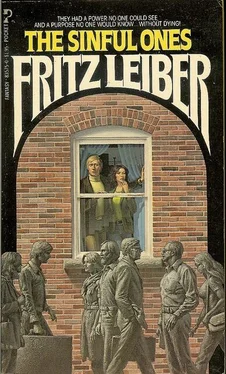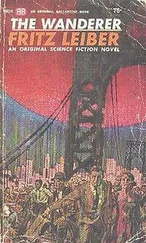“That’s right,” said the small dark man. “Jump in.”
Angrily Carr complied. But before he could say anything, the other had started to talk. His voice was no longer facetious, but low, bitter, almost confessional. His head was bent. He did not look at Carr.
“In the first place,” he said, “I want you to understand that I don’t trust you. And I certainly don’t like you—if I did, I’d b doing my best to get you out of this instead of leading you straight toward the center. And finally, I don’t give a damn what happens to you, or to myself. But I still do have a certain quixotic concern for what happens to Jane. It’s for her sake, not yours, that I’m going to do what I’m going to do.” He put his hand on the gear-shift lever.
“And what are you going to do?” snapped Carr.
The convertible bucked, leaped forward with a roar.
Carr’s gaze swung up as the grimy red wall of a truck looked higher, higher. WORLD MOVES, the sign said. He closed his eyes. He felt a blood-checking swerve, gritted his teeth at the wood-on-steel caress along the fender. When he opened his eyes again, it was to see a woman and child flash by not a foot from the wheels. He lurched sideways as they screamed around a corner, let go his hat to cling to the car, watched a coupe and bus converge ahead of them, closed his eyes again as they grazed through the gap.
He wasn’t going to die because of any mysterious intrigue-spawned peril. Oh, no! He and the small dark man with glasses were merely going to provide two unusually well-mangled additions to the year’s traffic fatalities.
“Stop, you jerk!”
The other did not take his eyes off the street ahead, but bared his gums in a grin. Crouching there so small and frail behind the wheel, black hat blown off, hair streaming back, face contorted, peering ahead through glasses as thick as telescope lenses, he looked like some spindle-bodied man of the future hurling himself at eternity.
To either side, small indistinguishable stores and dusty white street globes shot by, while blocks of asphalt vanished under the hood.
“Tell me what it’s all about before you kill us,” yelled Carr.
The small dark man snickered through his teeth. “Do I dare explain the universe?”
Ahead of them cars skittered to the curb like disturbed ants. Over the motor’s roar Carr became aware of a wailing that grew in volume. A wild white light, mixed with red, began to flood the street from behind them, its beam swinging back and forth like a giant pendulum. Then from the corner of his eye Carr noticed a seated man in a big black slicker, traveling at a level several feet above him, heave into view, creep abreast. Below and ahead of the man was a bright vermillion hood from which the wailing came. Behind man and hood were dim ladders and coils, other swaying and slickered figures.
Ahead the street took a jog. Cars parked zigzag like a rail fence made it impossible that both their car and the fire engine should get through.
Grinning wider, the small dark man nursed the throttle. The fire engine dropped back a little, hung on tenaciously, dropped back just enough more to let them careen through the gap, while frozen pedestrians gaped.
Carr’s fear left him. There was no use to it.
“You and Jane are both insane, aren’t you?” he screamed.
The small man’s snort seemed to be torn from his lips by the wind.
“That would be nice,” he said.
The street narrowed, its sides grew dark. Behind them the fire engine braked, took a turn.
From ahead came a cold whiff of water and oil. Skyscrapers twinkled against the sky, but just this side of them a gap in the buildings was widening. Immediately ahead a skeletal black structure loomed.
A rapid clanging started. Towers flanking the black structure began to blink red.
Without warning Carr grabbed for the ignition, stamped at the brake. “They’re opening the bridge!” he yelled.
The small man kicked him in the ankle, punched his hand away from the dashboard and accelerated. Ahead was stopped autos, the black-and-white semaphore of a barrier. Swinging far the left, they struck its flexible end. It rasped along the car’s side like a stick against a picket fence, tore free with a great twang. They shot forward onto the dark span. To either side, solidity dropped away. Far below, yellow windows of skyscrapers flowed in uneven patterns on the water. To the left was the dark bulk of a lake freighter with figures moving on the dimly lit bridge. Beside it Carr seemed to glimpse a much smaller hull and the tiny pale oval of a single upturned face.
They were three-quarters of the way across when, through their hurtling speed, Carr felt the feather touch of a titan. Under them the span had begun to rise. Ahead of them a ribbon of blackness appeared, at the break in the jack-knife of the span.
The small dark man clamped the throttle to the floor. There was a spine-compressing jar and jounce, the skyscrapers reeled, then another jar, as the car came down—on its wheels.
The tip of the second barrier broke off with a giant snap. The open bridge had cleared the street ahead of traffic going their way. The small dark man breezed along it for four blocks like the winner of a race, then suddenly braked, skidded around a corner to the wrong side of the street. The two wheels on his side hit the curb and the car rocked to a stop.
Carr loosened his death-grip on dashboard and door-handle, balled a fist, and turned, this time without any compunction about glasses.
But the small man had jumped out of the car and was lightly running up the steps of a building that Carr now realized was the public library. As he hit the sidewalk in pursuit, he saw the small man briefly silhouetted against the yellow rectangle of the swinging door. When Carr stiff-armed through it, the man was vanishing at the top of a flight of marble stairs, under an archway decorated in twinkling gold mosaic with the names of Whittier, Emerson and Longfellow.
Reaching the top, Carr received a spurt of savage pleasure from the realization that he was gaining. Before him was a large, domed room, open shelves to one side, counters and booths to the other, unoccupied except for a couple of girls behind a window and a baldheaded man with a coat and briefcase awkwardly clamped under one arm as he stood on tiptoe to reach down a book.
The small dark man was racing under an archway commemorating the English poets Scott, Burns, Tennyson and Gray.
Carr raced at his heels past a desk behind which sat a starved, grayhaired woman who seemed too timid to look up or too fragile to permit herself quick reflexes. The small man darted toward a wall bearing long golden characters and Egyptian hieroglyphs. He ducked down a narrow corridor and to his shock Carr realized they were both running on frosted glass.
For a moment Carr thought that the small dark man had let him this long chase solely to get him to step through a skylight. Then he realized that he was on one of the many translucent catwalks that served as ashes in the stacks of the library. He sprinted forward again, guided by the sonorous pit-pat of receding footsteps.
He found himself in a silent world within a world. A world several stories high and covering a good part of a block. An oddly insubstantial world of thin metal beams, narrow stairs, translucent runways, and innumerable books. A world of crannies, slits and gaps.
Thus far, Carr had gained. But now, like some animal that has reached its native element, the small dark man held his own, craftily doubling and redoubling on his course, suddenly darting up or down stairs whose treads resounded like the clangor of ancient war. Carr caught glimpses of a flapping raincoat, he shook his fist with anger at some teeth and a grin spied through castellated gaps in successive tiers of books, he clutched futilely at a small, expensive-looking oxford disappearing up a metal-treaded stair in a tantalizing leisurely fashion.
Читать дальше









